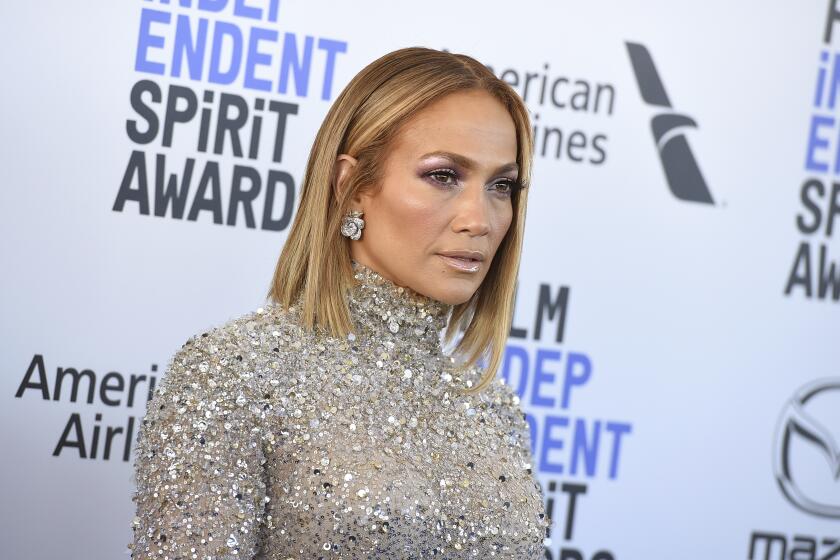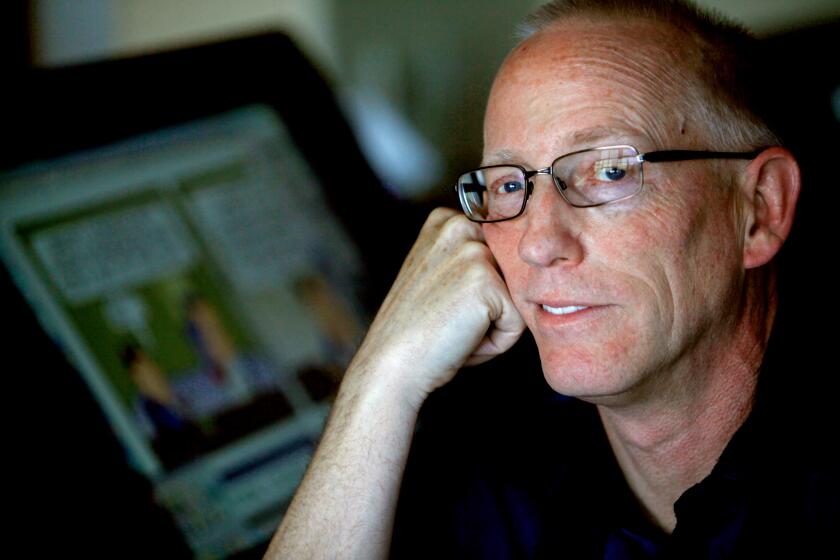Strike support is not on A-list
- Share via
Many actors have manned the picket lines along with their writing brothers and sisters since the Writers Guild of America strike began Nov. 5. But there has been a notable absence of a small group that under any other circumstance would monopolize it: A-list movie stars.
“Your fight is our fight” has been the Screen Actors Guild’s rallying cry to the Writers Guild membership during its two-month strike action. But the top-tier actors have universally declined to pick up a sign. Other than a momentary appearance by Ben Stiller, not a single top-tier movie star -- including some rather high-profile WGA hybrids -- has found it prudent to say or do anything publicly to support the writers’ cause.
Yes, such TV and film actors as Laura Linney, Julia Louis-Dreyfus and Josh Brolin have shown up on the line or in WGA-supportive United Hollywood videos.
But where’s Johnny Depp, Julia Roberts, Denzel Washington, Brad Pitt, Will Smith and Reese Witherspoon? They’ve remained deafeningly neutral, as if they were thinking that if they just stayed still and quiet enough, they could wait everybody out and avoid any partisanship.
“They don’t want to be branded hypocrites,” muses one manager-producer. “Because they’re working on movies that are [in production]. Even if there are no writers working on those movies, it’s like they’re still kind of crossing picket lines to work on them. . . . I think their publicists, smartly, are telling them to not take a side. Do you really gain much by taking a side?”
At the same time, the last two months have been a minefield of shuttered TV and film productions, gutted awards shows and late-night shows running on repeats, a fraught environment that has deprived much of the acting community of a crucial aspect of their jobs -- selling audiences on their movies and shows.
So many of them surely exhaled a huge sigh of relief Friday when the WGA announced an interim deal with Worldwide Pants Inc., owner of “Late Show With David Letterman” and “Late Late Show With Craig Ferguson,” that would allow those hosts to go back on the air with their full writing staffs.
Much of the rest of the late-night TV landscape -- Jay Leno, Conan O’Brien and Jimmy Kimmel, WGA members all -- returns to the airwaves tonight as well but will lunge for the funny without scripted help.
In terms of publicity forums for A-list actors (and the studios who pay them enormous amounts of money), these types of shows are essential.
And this is a critical momentum-building time for award campaigns, when decorated actor-writer-director hybrids such as Ben Affleck, George Clooney and Tom Hanks have Oscar-potential movies they need to hawk -- “Gone Baby Gone,” “Michael Clayton” and “Charlie Wilson’s War,” respectively. Which is why Letterman and Ferguson’s coming back with Writers Guild approval is such a godsend to conflicted stars.
Now, with the explicit encouragement of the WGA, as well as SAG President Alan Rosenberg, movie stars will be able to do what they need to do to shill for a project and still look principled, as long as they stick to Letterman and Ferguson.
If not, these marquee names would be stuck in the awkward position of having to cross picket lines to promote their award-worthiness, which could come at the expense of the men and women who gave them a reason to be in front of a camera -- and on Jay’s couch -- in the first place.
The education of a researcher
One of the great pleasures of screenwriting is the sense of discovery and insight unearthed while doing deep, first-hand research. Especially, as with stories based on real events, when it leads to exposure to historical personages who changed a small piece of their world.
In the 10 years that he was involved with bringing “The Great Debaters” to the screen, writer-producer Robert Eisele (“Resurrection Blvd.”) says he was fortunate to experience both. In 1997, an old college friend named Jeffrey Porro, a speechwriter for international figures such as Kofi Annan and Jimmy Carter, shared a short article written by Tony Scherman on the unexpected triumphs of the all-black Wiley College debate team during the Jim Crow-era 1930s.
Eisele and Porro (who shares story credit on Eisele’s script) recognized the seed of a great story, split up the research and tracked down most of the surviving team members. During those conversations, one eye-opening insight emerged about the cultural gifts the Wiley team members had turned into great strengths during the competitions, despite, or perhaps because of, the severe discrimination they suffered.
“There was an irony in this,” Eisele says. “Because they were such intellectually gifted people, and they had the southern black traditions of spoken word and the oratories of the black Southern Baptist preachers, they had an unfair advantage when they entered these competitions. And yet they profoundly felt they were underdogs.”
Additionally, Eisele had the “great honor” of interviewing civil rights icon James L. Farmer Jr. before his death in 1999. And though he grew up in a racially split neighborhood in Altadena in the ‘50s and ‘60s, Eisele had never truly understood the insidious psychological effects of racism until he spoke with and studied these students.
“For young men that were so profoundly intelligent, the effect of racism seeping right into their bones and making them doubt and perhaps even in rare instances have a certain amount of self-hatred, because of the Jim Crow-ism that surrounded them . . . ,” says Eisele. “I knew this existed to some extent, but I didn’t feel it like I did after doing this research. Because, ultimately, you have to crawl into your characters’ skins.”
--
Scriptland is a weekly feature on the work and professional lives of screenwriters. E-mail fernandez_jay@hotmailcom.
More to Read
The biggest entertainment stories
Get our big stories about Hollywood, film, television, music, arts, culture and more right in your inbox as soon as they publish.
You may occasionally receive promotional content from the Los Angeles Times.










